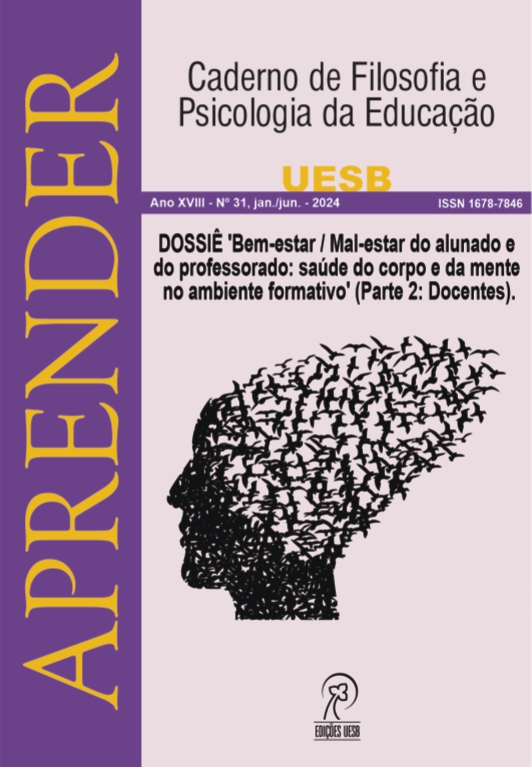Teachers’ wellbeing: an exploratory study with portuguese schools abroad
DOI:
https://doi.org/10.22481/aprender.i31.14643Keywords:
Subjective well-being, Teacher well-being, Schools abroadAbstract
The well-being of teachers is a particularly relevant topic and is receiving increasing interest. However, studies on schools abroad are scarce, which is why this study aims to explore the well-being of these teachers, in particular, to describe their subjective well-being and well-being at school, exploring the role of personal and professional variables in teacher well-being. To this end, a sample of 58 teachers teaching in Portuguese schools abroad was taken, most of them women, aged between 27 and 69. The results suggest an overall positive subjective well-being, above the midpoint, and significant relationships with organizational variables. These aspects are discussed. Further research in this area is also suggested.
Downloads
References
Afonso, N. (2019). Escala de Bem-Estar dos Professores - Adaptação e validação da Escala TWBS para a língua portuguesa. [Dissertação de Mestrado]. Instituto Universitário de Ciências Psicológicas, Sociais e da Vida.
Arthur, & Bradley, S. (2023). Teacher retention in challenging schools: please don't say goodbye. Teachers and Teaching, Theory and Practice, 29(7-8), 753-771. https://doi.org/10.1080/13540602.2023.2201423
Bradshaw, J., Martorano, B., Natali, L., & De Neubourg, C. (2013). Children’s subjective well-being in rich countries. Child Indicators Research, 6(4), 619–635. https://doi.org/10.1007/s12187-013-9196-4
Cummins, R. A. (1995). On the trail of the gold standard for life satisfaction. Social Indicators Research, 35(2), 179–200. https://doi.org/10.1007/BF01079026
Cummins, R. A. (1998). The second approximation to an international standard for life satisfaction. Social Indicators Research, 43(3), 307–334. https://doi.org/10.1023/A:1006831107052
Cummins, R. A. (2009). Measuring population happiness to inform public policy. In The 3rd OECD World Forum on «Statistics, Knowledge and Policy». Available at http://www.oecd.org/site/progresskorea/44118661.pdf
Cummins, R. A. (2010). Subjective wellbeing, homeostatically protected mood and depression: A synthesis. Journal of Happiness Studies, 11(1), 1–17. https://doi.org/10.1007/s10902-009-9167-0
Cummins, R. A. (2018). The golden triangle of happiness: Essential resources for a happy family. International Journal of Child, Youth and Family Studies, 9(4), 12–39. https://doi.org/10.18357/ijcyfs94201818638
Cummins, R. A., & Lau, A. L. D. (2005). Personal Well-Being Index—School Children (PWI-SC) Manual (3rd ed.). Deakin University.
Davern, M. T., Cummins, R. A., & Stokes, M. A. (2007). Subjective wellbeing as an affective- cognitive construct. Journal of Happiness Studies, 8(4), 429–449. https://doi.org/10.1007/s10902-007-9066-1
de Heus, P., & Diekstra, R. F. W. (1999). Do teachers burn out more easily? A comparison of teachers with other social professions on work stress and burnout symptoms. In R. Vandenberghe & A. M. Huberman (Eds.), Understanding and preventing teacher burnout: A sourcebook of international research and practice (pp. 269–284). Cambridge University Press. https://doi.org/10.1017/CBO9780511527784.019
Dias, P. C., & Bastos, A. S. (2014). Application of the personal wellbeing index with Portuguese adolescents. In A. C. Michalos (Ed.), Encyclopedia of quality of life and well-being research (pp. 56-59). Springer Netherlands.
Dias, P.C. (2023). Application of the Personal Well-being Index (School Children Version) in Portugal. In F. Maggino (ed.), Encyclopedia of Quality of Life and Well-Being Research. Genebra: Springer Nature Switzerland. https://doi.org/10.1007/978-3-319-69909-7_3998-2
Diener, E., Suh, E. M., Lucas, R. E., & Smith, H. L. (1999). Subjective well-being: Three decades of progress. Psychological Bulletin, 125(2), 276-302. https://doi.org/10.1037/0033-2909.125.2.276
Foster, D. (2019). Teacher recruitment and retention in England (House of Commons briefing paper 7222). UK Parliament.
Jerrim, J., Sims, S., Taylor, H. & Allen, R. (2020a) How does the mental health and wellbeing of teachers compare to other professions? Review of Education. 8(5), 659-689. DOI: 10.1002/rev3.3228
Jerrim, J., Sims, S., Taylor, H., & Allen, R. (2021) Has the mental health and wellbeing of teachers in England changed over time? New evidence from three datasets. Oxford Review of Education, 47(6), 805-825, DOI: 10.1080/03054985.2021.1902795
Lau, A. L., Cummins, R. A., & Mcpherson, W. (2005). An investigation into the cross-cultural equivalence of the personal wellbeing index. Social Indicators Research, 72(3), 403– 430. https://doi.org/10.1007/s11205-004-0561-z
McNeven, S., Main, K., & McKay, L. (2023). Wellbeing and School Improvement: A Scoping Review. Leadership and Policy in Schools. https://doi.org/10.1080/15700763.2023.2183512
Pais Ribeiro, J., & Cummins, R. (2008) O bem-estar pessoal: estudo de validação da versão portuguesa da escala. In I.Leal, J.Pais-Ribeiro, I. Silva & S.Marques (Eds.). Actas do 7º congresso nacional de psicologia da saúde (pp. 505-508). Lisboa: ISPA.
Parker, S. K., & Grote, G. (2020). Automation, algorithms, and beyond: Why work design matters more than ever in a digital world. Applied Psychology, 31(4), 665–699. https://doi.org/10.1111/apps.12241
Perryman, J., & Calvert, G. (2020). What motivates people to teach, and why do they leave? Accountability, performativity and teacher retention. British Journal of Educational Studies, 68 (1), 3–23. https://doi.org/10.1080/00071005.2019.1589417
Sonnentag, S., Tay, L. & Shoshan, H. N. (2023). A review on health and well-being at work: more than stressors and strains. Personnel Psychology, 76, 473–510. https://doi.org/10.1111/peps.
Tiliouine, H., Cummins, R. A., & Davern, M. (2006). Measuring wellbeing in developing countries: The case of Algeria. Social Indicators Research, 75(1), 1–30. https://doi.org/10.1007/s11205-004-2012-2
Downloads
Published
How to Cite
Issue
Section
License
Copyright (c) 2024 APRENDER - Caderno de Filosofia e Psicologia da Educação

This work is licensed under a Creative Commons Attribution-ShareAlike 4.0 International License.






